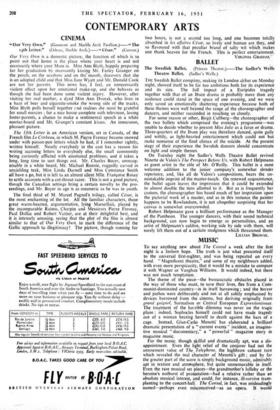CONTEMPORARY ARTS CINEMA
Our Very Own." (Gaumont and Marble Arch Pavilion.)--44 The s3th Letter." (Odeon, Marble Arch.)—“Cesar." (Curzon.)
Our Very Own is a domestic picture, the function of which is to point out that home is the place where your heart is and not necessarily where your Mum is. Miss Ann Blyth, happily preparing for her graduation by incessantly kissing Mr. Farley Granger on the porch, on the seashore and on the mouth, discovers that she is an adopted child and that Miss Jane Wyatt and Mr. Donald Cook are not her parents. This news has, I feel, an unnecessarily violent effect upon her emotional make-up, and she behaves as though she had been done some violent injury. However, after visiting her real mother, a dyed Miss Ann Dvorak, who lives in a haze of beer and cigarette-smoke the wrong side of the tracks, Miss Blyth pulls herself together rnd realises she must be grateful for small mercies ; for a nice house complete with television, loving foster-parents, a chance to make a sentimental speech in a white mortar-board and Mr. Granger's constant kisses. An innocuous, pleasant picture.
The 13th Letter is an American version, set in Canada, of the French film Le Corbeau, in which M. Pierre Fresnay became snowed under with poison-pen letters which he had, if I remember rightly, written himself. Nearly everybody in the cast has a reason for writing accusing letters to everybody else, the small community being curiously afflicted with emotional problems, and it takes a long, long time to sort things out. Mr. Charles Boyer, unrecog- nisable in a white beard, Mr. Michael Rennie, ruggedly carved in unyielding teak, Miss Linda Darnell and Miss Constance Smith all have a go, but it is left to an almost silent Mlle. Frangoise Rosay to settle accounts with a cut-throat razor. This is not a good picture, though the Canadian settings bring a certain novelty to the pro- ceedings, and Mr. Boyer in age is as mesmeric as he was in youth.
The final third of M. Marcel Pagnol's trilogy, called Cesar, is the most enchanting of the lot. All the familiar characters, those great warm-hearted, argumentative, lying Marseillais, played by the incomparable Raimu, Charpin and Messieurs Pierre Fresnay, Paul Dullac and Robert Vattier, are at their delightful best, and It is intensely amusing, seeing that the plot of the film is almost similar to that of Our Very Own, to mark the difference of the Gallic approach to illegitimacy! The picture, though running for two hours, is not a second too long, and one becomes totally absorbed in les aflaires Cesar, so lively and human are they, and so flavoured with that peculiar brand of salty wit which makes one thank heaven for the French. This is perfect entertainment.
VIRGINIA GRAHAM. •


































 Previous page
Previous page